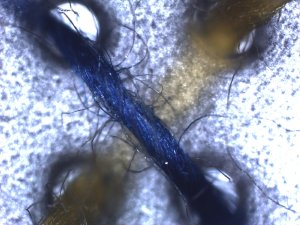Feb 17 2010
Scientists in Australia are reporting the first use of ordinary cotton thread and sewing needles to literally stitch together a microfluidic analytical device - microscopic technology that can transport fluids for medical tests and other purposes in a lab-on-a-chip.
 Cotton thread, shown in this close-up image, provides a simple way to transport fluids for low-cost "lab-on-a-chip" tests for detecting
disease and other purposes. Credit: Wei Shen
Cotton thread, shown in this close-up image, provides a simple way to transport fluids for low-cost "lab-on-a-chip" tests for detecting
disease and other purposes. Credit: Wei Shen
The chips shrink room-sized diagnostic testing equipment down to the size of a postage stamp, and promise revolutionary applications in medicine, environmental sensing, and other areas. Their study is in ACS Applied Materials + Interfaces, a monthly journal: "Thread as a Versatile Material for Low-Cost Microfluidic Diagnostics."
Wei Shen and colleagues note that the development of low-cost "lab-on-a-chip" diagnostic tests has become an attractive area of research. Existing devices require etching microscopic channels onto slivers of silicon, glass, ceramics, or metal in a costly, complicated process. The scientists set out to find an alternative, and did so with cotton thread, which wicks fluids along its tiny fibers.
They stitched thread into paper to form microfluidic sensors capable of detecting and measuring substances released in the urine of patients with several human medical conditions. "The fabrication of thread-based microfluidic devices is simple and relatively low cost because it requires only sewing needles or household sewing machines," the report said. "Our results demonstrate that thread is a suitable material for fabricating microfluidic diagnostic devices for monitoring human health, environment and food safety, especially for the population in less-industrialized areas or remote regions."